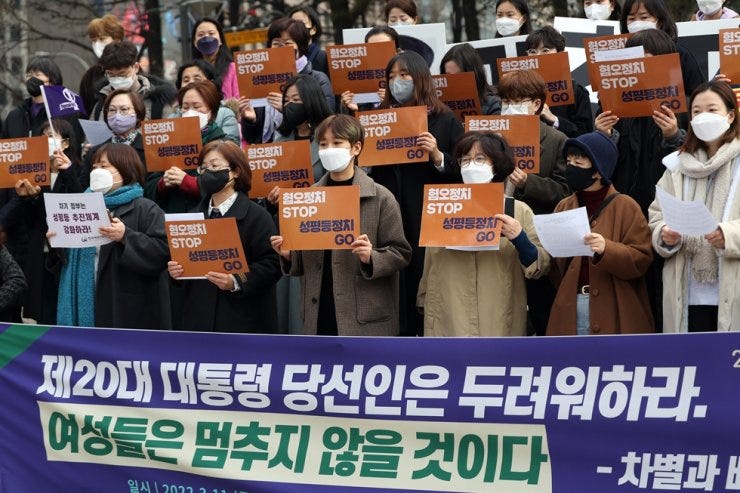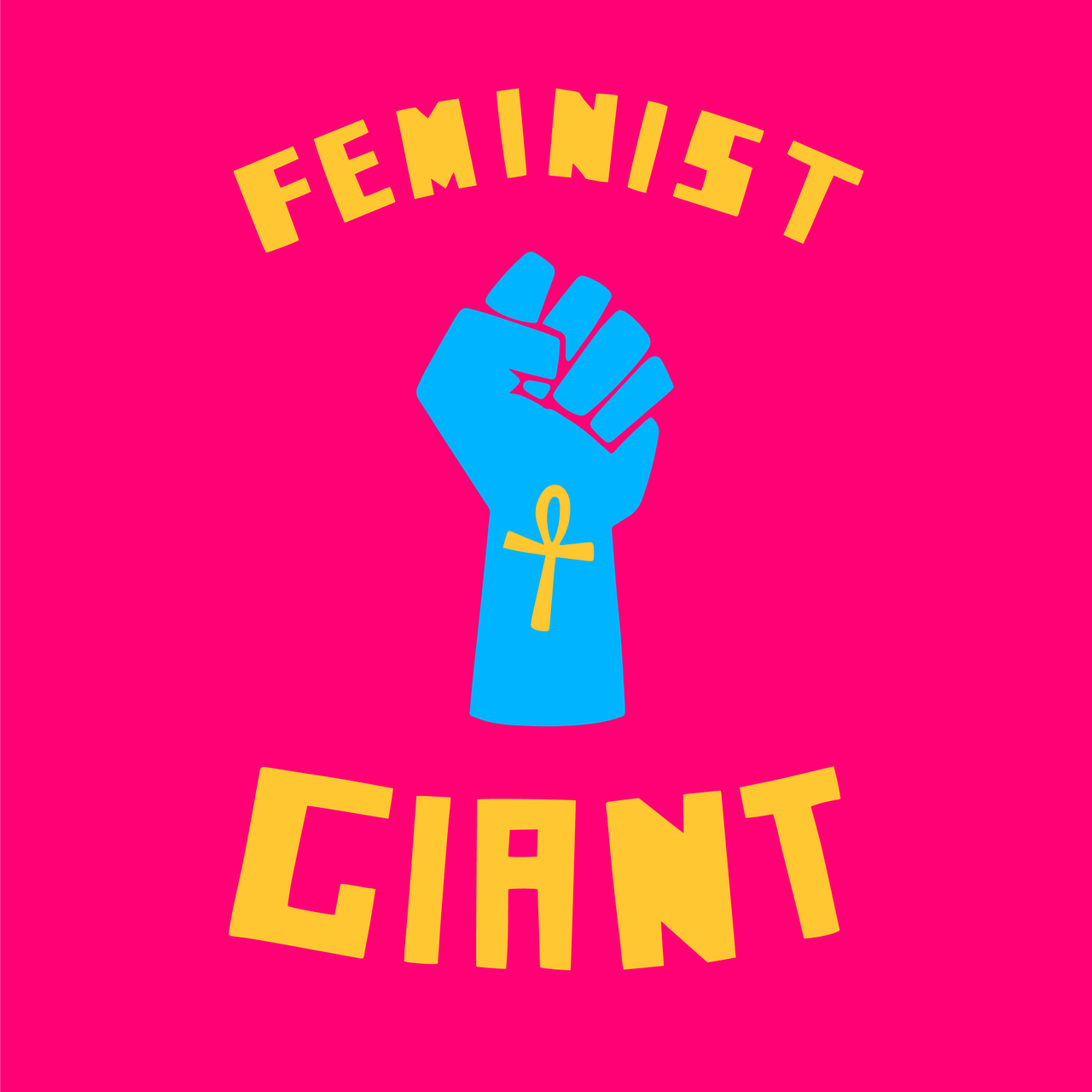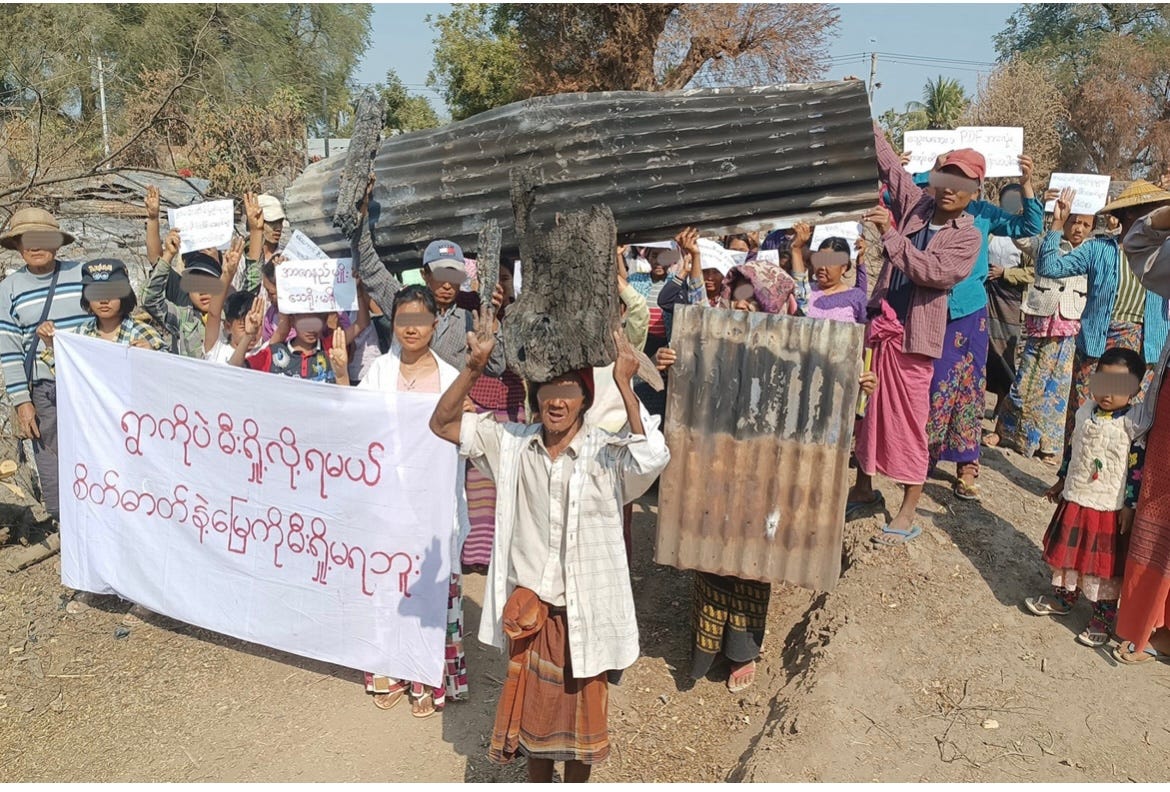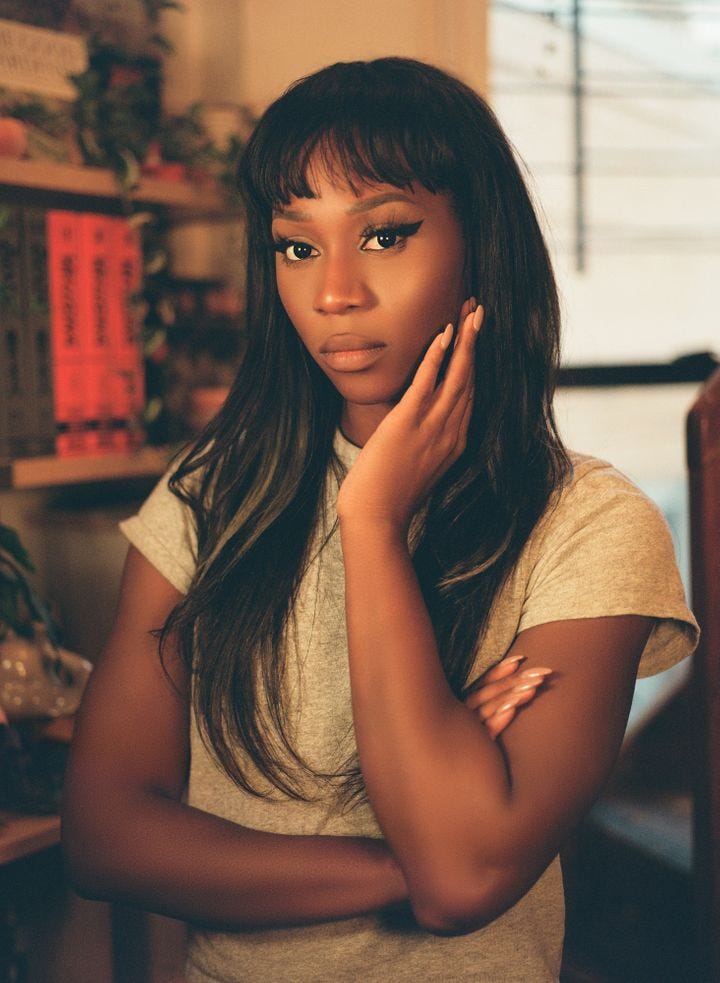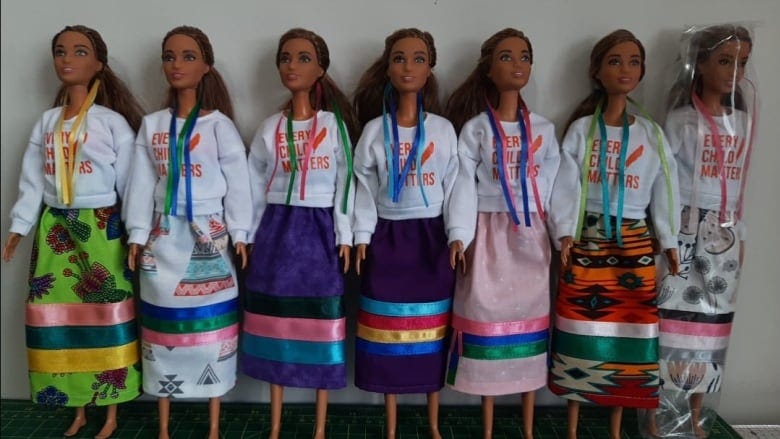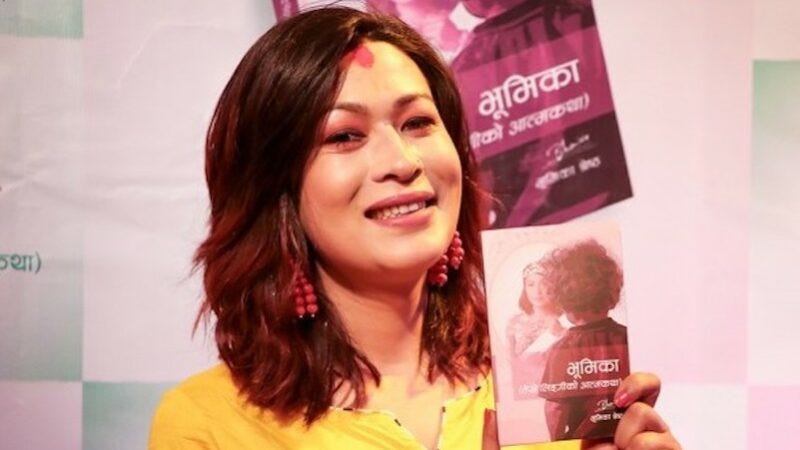Global Roundup: Anti-feminist South Korean President, Women vs Myanmar Regime, Black Trans Sex Worker on HIV Stigma, Indigenous Ribbon Skirt Dolls, Nepal Trans Activist Wins Award
Curated by FG contributor Samiha Hossain
Members of women's advocacy groups hold a press conference in Jung District, Seoul, Friday. The slogan in Korean on the orange signs reads, "Stop politics of hatred, Go politics of gender equality." Yonhap via Korea Times
Yoon Suk-yeol’s election as the next president of South Korea has been met with dismay by feminists and women’s organizations. Former top prosecutor Yoon defeated the liberal ruling party candidate Lee Jae-myung by a margin of 263,000 votes in one of the most closely contested presidential elections in recent memory.
Yoon has been fuelling the country’s gender divide to garner support from young male voters. He has blamed the country’s low birthrate on feminism and promised to enhance punishments for false accusations of sexual violence, a step campaigners say will deter even more women from coming forward.
Everyone knows that misogyny in Korea is a serious problem, and while it’s comforting to see change is occurring, when I saw the election of a candidate who pledged misogyny, I knew we still have a long way to go. - Kim Hye-yoon, 34-year-old woman from Gwangju
Jieun Choi is a South Korean journalist and survivor of spycam crime – the use of secret cameras to film women, often in public toilets. Some 80% of survivors of spycam crime are women and 98% of perpetrators are men. Jieun compared the solidarity women feel in 2022 to the massive street protests that were organized by women online against the use of spycams in 2018. She said the election was a “pivotal moment” in terms of how women’s issues are talked about in public discourse.
After Yoon’s election, the Korea Women’s Associations United issued a statement accusing him of “disappointing many people by actively using the regressive and fictional frame of hate incitement and gender conflict” and urging the incoming government to fulfill its responsibility to realize gender equality.
Korean society will continue to be very unequal and polarized, and I am very concerned about how this discrimination will be resolved. - Yanglee Hyun-kyung, co-representative of Korea Women’s Associations United
Yoon has also called for the abolishment of the gender equality ministry, which he says focuses too much on women’s rights and is no longer necessary. A coalition of 27 women's advocacy groups held a press conference in Jung District, Seoul, Friday criticizing Yoon and the main opposition People Power Party (PPP) of inciting hatred and exacerbating the gender divide during the presidential race. The women’s rights groups said such a pledge could end up justifying and intensifying discrimination and violence against women and minorities.
Villagers protest against Myanmar’s military regime in Sagaing Region’s Pale Township (Pale People’s Strike Committee) via Myanmar Now
Women, including homemakers, have been at the forefront of the struggle against the junta forces in Myanmar. Sagaing Region has borne the brunt of the junta’s scorched-earth campaign to eradicate opposition to its rule. According to one estimate, around 60% of the more than 6,000 homes set on fire by regime forces since the coup were in Sagaing.
Hla May was not reduced to despair the way her home had been reduced to ashes. “You can burn our village, but not our spirit and our soil,” she said defiantly. The others who gathered around her repeated her words, which had become the newest slogan of their movement to resist Myanmar’s brutal military regime. Hla May used to be a farmer but now, however, she lives in the forest, surviving on food donated by other villages.
I had to give up my work. I couldn’t do it anymore. But to tell the truth, I’m not interested in doing my work now. All I want to do is focus on winning the revolution. - Hla May
For 20-year-old Nyein, who also lived in Pan Ywar (a village in Sagaing region) until it came under attack, these past few weeks have been the hardest of her life. An avid gardener, Nyein was devastated when she saw that the plants she had cultivated with such care had been set ablaze by junta troops. Despite her sadness at the destruction, she said she did not regret her opposition to the regime.
We can’t just surrender without resisting. It can’t be helped that they burned down our houses because of that. - Nyein
Forced to flee with nothing but the clothes on her back, Nyein said she had to go for days without bathing when she first arrived in the forest. Feminine hygiene products are still unavailable. She now lives on a bamboo mat under a tarpaulin sheet and her situation is precarious.
But even under these circumstances, Nyein and other women in the village decided to hold a protest against the junta 11 days after their homes were destroyed. Brandishing fragments of their former lives as symbols of defiance, they demanded that the junta give up power and restore the country’s rightful government.
Women like Hla May and Nyein who have lost their home and all their possessions are determined to do whatever it takes to bring down the dictatorship.
We will uproot the military council, no matter how difficult it is. We will never surrender. We will never get down on our knees. We will continue the revolution from the jungle or anywhere else. - Hla May.
Vanniall photographed at home in her New York City apartment. Ashley Lake via HuffPost
In an essay, Black trans sex worker, Vanniall, comes out as HIV-positive. She mentions how she has had to come out as gay, as trans, and as a sex worker. However, after being diagnosed with HIV in 2021, she suddenly felt like she was back in the closet.
Vanniall talks about how the adult entertainment industry was one of the few places where it felt possible for people like her to survive or actually have a career. She has directed her own feature-length films, controlling her own distributions, and has just started breaking into a mainstream career with major bookings for other studios.
I had carved out a niche for myself, proudly, as a Black trans woman, sexy in my own body. But with my HIV diagnosis, that felt like it was going to come crashing down. All of a sudden, I was dodging texts from talent about shoots and giving generic excuses to major studios I had spent years courting and setting up business with. - Vanniall
Vanniall highlights the importance of regular testing and how testing among non-sex workers is dismally low compared to sex workers, but no one uses shock headlines to report on individual cases in other industries. However, she thinks the adult industry fails in supporting people who actually have HIV and must live with it. Currently, tests are only done to show whether someone is HIV-positive, not whether their HIV is transmissible. This unfairly groups people who have the virus under control through medication with people who have just had it detected but have not yet been medicated.
Stigma against HIV+ people and LGBTQ folk scares others away from regular testing and medication. The same fear forces HIV+ sex workers away from a safe performing income. - Vanniall
Vanniall believes we can fight this stigma with education. She says organizations and trade groups should center the needs of HIV+ performers in their HIV policy, and not the people scared of them. In addition, there is work to be done to allow free clinics into adult testing databases, since current testing costs too much and most indie content is created outside the for-profit Talent Testing system.
To functionally reduce stigma, we also need in-person sex work decriminalized and “occupation” added to the list of protected classes, so sex workers can organize for safety and build stability instead of letting outside forces regulate our work to our detriment with terrible laws like SESTA. - Vanniall
Vanniall is now at peace with her diagnosis. She is grateful to have built platforms where she can work independently and educate others. However, despite the comfort of working for herself, she aspires to achieve her dreams of becoming a mainstream name.
Tracy Boucher, an Indigenous artisan, handmakes each ribbon skirt for her Indigenous dolls. The sweaters say Every Child Matters to honour children who were sent to residential schools. (Tracy Boucher) via CBC
Tracy Boucher, an Indigenous artisan, handmakes each ribbon skirt for her Indigenous dolls and people around the world have reached out to her to purchase them. She has already sold hundreds of dolls, with many people on the waiting list. Boucher initially planned to sell the dolls at a Christmas market in Edmonton, Canada. But one of her daughters took a picture of the dolls and posted it on social media beforehand, flooding them with requests.
Boucher, a member of the Indigenous Artist Market (I.A.M.) Collective and owner of TB Crafting, started making dolls dressed in handmade ribbon skirts last November. Ribbon skirts must be long enough that they can connect with the grass – a symbol of Mother Earth's hair. When a person wearing a ribbon skirt walks along the earth, it touches the hairs of Mother Earth, letting her know "we are women and we are there." The ribbon skirt teaches Indigenous girls and two-spirited kids that "they are very precious and sacred," Boucher said, and she hopes her dolls can help impart that message.
Boucher first got the idea to make the dolls after realizing there was nothing for kids to buy at the store outside the Indigenous Peoples Experience Pavilion at Fort Edmonton Park. Her daughters, growing up, played with blonde-haired, blue-eyed Barbies, so she knows how parents feel about getting their kids a toy that looks like them.
It means the world that our kids can proudly display their dolls, wear their ribbon skirts, identify with who they are and how they look. - Tracy Boucher
Some of those looking to purchase dolls are family members of women who have come to symbolize the missing and murdered Indigenous women and girls (MMIWG) movement. Boucher said the family of Chantel Moore asked for a doll for Moore's daughter. In 2020, Chantel Moore was fatally shot by police in New Brunswick during a wellness check at her apartment. The officer involved did not face charges following an investigation by Quebec's police watchdog, and an inquiry into her death has been further delayed until May 16.
The main goal, Boucher said, is to bring attention to MMIWG and children sent to residential schools. She dresses her dolls in sweaters emblazoned with "MMIWG" or "ECM" (Every Child Matters). Her own father was a survivor of St. Albert Youville residential school.
When they started discovering all of the unmarked graves [at other former school sites], society was like, 'oh my God, this didn't happen.' But all Indigenous people knew it was there. - Tracy Boucher
Nepali Transgender Bhumika Shrestha via Global Voices
Bhumika Shrestha is an LGBTQ+ activist from Nepal who received the 2022 International Women of Courage (IWOC) Award from the US government. The award is given to women around the world who promote women's rights and have shown leadership, courage, and willingness to sacrifice for others. For the last fifteen years, Shrestha has been working to address the challenges of the transgender community of Nepal.
Growing up, Shrestha was bullied, harassed and called names because of her feminine characteristics, which added to her mental trauma. However, she was lucky to have constant support from her family.
When I was a student, I used to be scared of light, I used to be intimidated and self-conscious about my appearance, I always had this fear that if I stepped out in the daytime people would bully me. I felt more comfortable going out at night as people would not see me or judge me for who I am. - Bhumika Shrestha
Now, Shrestha is fighting for equal citizenship rights for her community. In Nepal, the government requires a health certificate to issue a citizenship certificate for transgender people. Bhumika and her organization are advocating that the government should respect the privacy of LGBTQ+ people and give them citizenship cards for whatever gender they identify as. Shrestha also advocates for and leads the discussion of the issues of health and HIV AIDS awareness and prevention, policy reform in governance, human rights, employment and career opportunities, and media and culture representation for LGBTQ+ people of Nepal.
…We may have different issues but I believe we should equally speak up for each other. I am committed to speaking up for other minority women and for women's rights in general. - Bhumika Shrestha
Nepal has made some progress when it comes to the acceptance of the LGBTQ+ community. Homosexuality was legalized in 2007 and in 2015 the constitution was reformed to include the right to receive a citizenship certificate under the ‘others’ gender category for the LGBTQ+ community. Still, the community faces high levels of discrimination and violence. There is a lack of LGBTQ+ people at the policymaking level, in health, or in education, and there are no employment opportunities for the community. The legalization of same-sex marriage is another major challenge.
Shrestha is the second woman to win the IWOC award. Advocates like her are vital to communities in fighting for the rights of those that are marginalized.
Samiha Hossain (she/her) is a student at the University of Ottawa. She has experience working with survivors of sexual violence in her community, as well as conducting research on gender-based violence. A lot of her time is spent learning about and critically engaging with intersectional feminism, transformative justice and disability justice.
Samiha firmly believes in the power of connecting with people and listening to their stories to create solidarity and heal as a community. She refuses to let anyone thwart her imagination when it comes to envisioning a radically different future full of care webs, nurturance and collective liberation.


